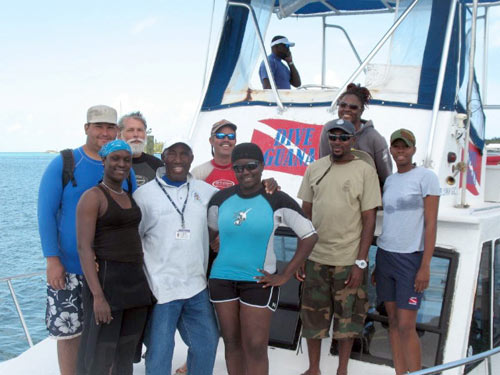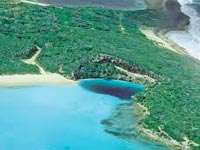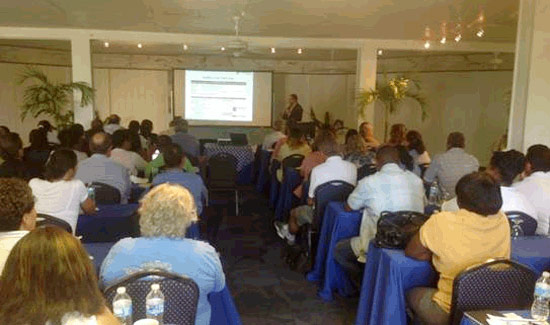
ABACO, The Bahamas – The Bahamas National Trust (BNT) recently facilitated an Eco Diver training course in Abaco for seven (7) certified Scuba Divers to assist in monitoring Abaco Marine Protected Areas. The BNT is implementing a grant project entitled “Development and Effective Management of Marine Protected Areas in the Abaco’s”. The project which is being implemented by the BNT will develop management plans for the six marine protected areas in Abaco, build capacity for the use of GIS Technology, provide training for protected area managers (BNT, Department of Marine Resources (DMR)), improve community involvement, and increase local capacity to assist with evaluation and monitoring.
The Eco Diver training course was the first step in increasing local capacity to assist in monitoring Abaco’s marine protected areas. Participants were trained in coral reef monitoring protocols that are recognized internationally and facilitated by the Reef Check Foundation. The Reef Check Foundation is an international non-profit organization dedicated to the conservation of specific ecosystems including tropical coral reefs.
Participants in the course held in Abaco included representatives from Bahamas Customs, Department of Marine Resources, Bahamas Marine Mammal Research Organization, Dive Guana and BNT Staff from the Abaco and New Providence Offices. The training course included classroom lectures, written exams and practical field dives, followed by Reef Check Surveys at The Pillars and Grouper Alley reefs located within the new Fowl Cays National Park.
The participation of local volunteers is critical to managing the health of coral reefs in The Bahamas. Designating “marine protected areas” supports reef sustainability, however there needs to be a system of reef monitoring to measure the effects of overfishing, sedimentation (dredging), pollution and global climate change. Monitoring changes through data collection within a reef’s ecosystem is necessary for reef survival and overall health.
Formal reef check training insures that accurate information is reported and that data can be compared to analyze any changes that reefs may have experienced over time. Reef Check Teams visit sites documenting fish, invertebrates and substrate types that have been measured out in a grid like fashion. Teams regroup after dives to review the collected data to ensure accuracy before leaving the site, subsequently submit survey data to be included in a global coral reef monitoring database.
The recent training in Abaco raises the number of certified Eco Divers trained in the Reef Check methodology to 24, with 5 of those being certified as Reef Check trainers. The training of trainers session conducted earlier this year in New Providence was supported by funding from the Global Environmental Facility (GEF) full sized project “Building a Sustainable Network of Marine Protected Areas”.
The marine protected area project for Abaco is being supported by grant funding from The United Nations Environment Programme (UNEP), Caribbean Environment Programme (CEP), and The Caribbean Marine Protected Area Management Network & Forum (CaMPAM) and The Italian Government with local assistance from Dive Guana Enterprises.
For more information on the Reef Check EcoDiver programme visit www.reefcheck.org . If you are interested in more information about the Bahamas National Trust and how you can get involved visit www.bnt.bs or like their Facebook page (Bahamas National Trust).
By Bahamas National Trust



